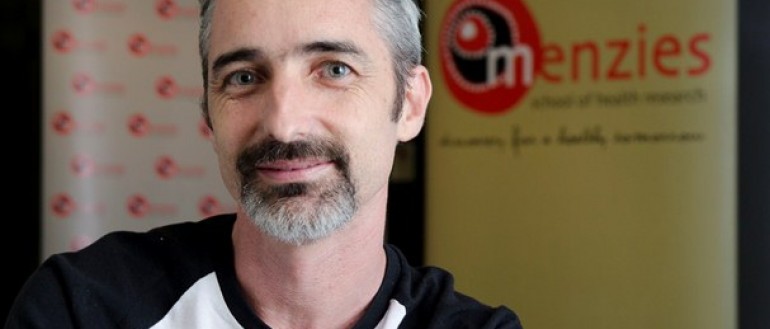Menzies infectious diseases specialist, Dr Josh Davis was recently awarded a Career Development Fellowship as part of the National Health and Medical Research Council’s (NHMRC) yearly multi-million dollar funding round.
Josh’s fellowship provides support for his salary for the next four years. He shares his thoughts on the fellowship.
What is the title of your fellowship?
Addressing major evidence gaps in the management of severe bacterial infections.
What major health issue does your research hope to address and how?
There is a lack of evidence to inform the management of most infectious diseases. My research will address common severe infections including bone and joint infections, skin infections, severe sepsis and Staph aureus infections.
Currently we don’t have much good clinical evidence available to answer such important questions as: ‘how long we should treat these infections’ and ‘what are the best antibiotics to use’. I hope to generate evidence in these areas by designing and carrying out randomised controlled trials.
What is the most exciting aspect of your funding win?
An NHMRC career development fellowship is a prestigious and competitive award, so I feel honoured to be chosen for one. The really important aspect of this fellowship is that it will allow me to dedicate half of my time to research while I continue to work as an infectious diseases specialist treating people at hospitals.
Without dedicated, funded research time, most hospital doctors become so busy that they are unable to complete any serious research. The award means I can continue to combine two aspects of my work which I really enjoy: working as a clinician and also doing research to help improve knowledge in managing severe infections.
What are the proposed details of your research methodology (sample numbers, sites etc)?
Along with several teams of my colleagues from around Australia and also Singapore, I am planning randomised trials of new ways of treating several important infections, including:
- MRSA (“golden staph”) blood stream infections - Is combination antibiotic treatment better than standard treatment?
- Infections of artificial joints - What is the best type of antibiotic to use, and how long do we need to give it for to cure these infections?
- Cellulitis (a skin infection causing a red, hot swollen leg) – Do people get better faster if you give an anti-inflammatory drug as well as the usual antibiotics?
- Severe sepsis – Does giving antibiotics by continuous intravenous infusion lead to better survival than giving them in the usual way?
What are the broader health implications of your fellowship?
Improving the evidence-base for the treatment of severe infections will influence national and international treatment guidelines, and thus will affect the treatment of people all around the world with these common infections. Having more rational and evidence-based treatment recommendations is likely to lead to better outcomes (eg lower mortality and faster recovery) and lower costs.

